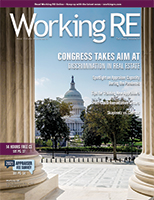 |
“One of the best courses that I have had in 17 years!” -Amy H
>> OREP E&O |
Editor’s Note:
To help gain some insight for the industry, Working RE magazine recently published 2021 Comp Photo Survey, which asks appraisers their opinion on the subject. The survey takes less than two minutes to complete. The results will be shared with the entire industry. Share your opinion on driving comparable sales now.
Congress Takes Aim at Discrimination in Real Estate
by Isaac Peck, Editor
Amid a media buzz surrounding racial bias in appraising, Congress responds.
In April 2021, the United States House of Representatives introduced Bill H.R.2553—Real Estate Valuation Fairness and Improvement Act of 2021 that could change the face of appraising. The Bill has currently passed the House Committee on Financial Services and is awaiting floor action. Sources close to the process report that it has strong support in the House.
To promote diversity within the appraisal profession, the Bill proposes that the Appraisal Subcommittee (ASC) will receive “authorization of appropriation” for grants of $50 million per year for fiscal years 2022 through 2026. You read that right, $50 million per year. The grant program would run for five years and total up to $250 million.
Included in the activities the ASC would be authorized to use the funds for:
A) funding scholarships,
B) providing training and education,
C) providing implicit bias training for appraisers, and
D) other activities as determined appropriate to further the purposes of this grant program by the ASC.
Task Force Rational
The Bill would establish an “Interagency Task Force on Real Estate Valuation,” facilitated by the ASC, and set to include as members 14 heads of leading governmental agencies and departments, including the Director of the Federal Housing Finance Agency (FHFA), the Secretary of Veteran Affairs (VA), the Undersecretary of Rural Development of the Department of Agriculture (USDA), the Comptroller of the Currency (OCC), the Chairperson of the Board of Directors of the Federal Deposit Insurance Corporation (FDIC), the Chairman of the Board of Governors of the Federal Reserve System, and many more.
The rationale for the Task Force is that the Federal Home Owners’ Loan Corporation and the Federal Housing Administration (among others) played a major role in the development of the modern home mortgage origination industry and that, the Bill states:
• Both Federal agencies explicitly considered the racial and ethnic makeup of neighborhoods when underwriting loans and valuing the real estate to be used as home loan collateral.
• Both agencies devalued property or refused to make loans secured by property in communities of color.
• The harmful consequences of this discrimination remain unresolved.
It is these “harmful consequences of discrimination” that the Task Force is meant to help resolve.
The Task Force’s first mandate will be to work to “harmonize to the greatest extent possible” all collateral underwriting standards and guidance that govern both residential and commercial real estate valuations. Interestingly, the Bill also includes reference to standards with respect to non-traditional valuations, including “automated valuation models (AVMs), reconsiderations of value, energy efficient housing, and limited or inactive markets.” This means that the Task Force will not only be looking at appraisals and USPAP, but also examining lender’s valuation guidelines as well. It will also be tasked with investigating whether AVMs and other market drivers lead to the disadvantaging of specific minority groups.
Additionally, the Task Force will create specific definitions for limited or inactive housing markets in which comparable sales are “limited or unavailable over a certain period of time.” Once defined, the Task Force will “establish greater flexibilities and guidance for appraisals and any underwriting processes associated with appraisals conducted in such markets, such as the ability to consider market evidence for similar properties in other geographic areas or utilizing a range of value.”
In other words, the Bill is signaling “special treatment,” i.e. “special” underwriting and appraisal processes, will be developed and implemented for “limited and inactive housing markets,” which the Bill leaves undefined but is clearly related to the Task Force’s aim of addressing the “harmful consequences of discrimination.”
The Task Force also will aggregate data and conduct studies to determine whether there are “racial disparities at both the borrower and community level in the valuation and price of the residential real estate to be used as collateral for mortgage applications.” Once that data has been aggregated and studied, the Task Force is mandated to “identify specific causes of such racial disparities and—adopt changes to address such causes.”
(story continues below)
(story continues)
Diversity in Appraisal Profession
As far as the ASC’s $50 million grant, the ASC would be mandated to allocate 50 percent of the funds to Historically Black Colleges and Universities (HBCUs), or alternatively, to universities with degree programs approved by the Appraiser Qualifications Board (AQB) or a relevant State regulatory agency. These funds would be used for scholarships for students of color who want to pursue a career in real estate appraisal and/or “subsidizing living expenses for those students while in training.”
Additionally, the ASC must allocate 20 percent of the funds to cover the cost of “fulfilling the experience requirements or other applicable requirements that students will need to complete in order to become appraisers.” The ASC would be authorized to allocate one percent of the grant, up to $500,000, for administrative costs for this program.
The ASC is empowered to “coordinate, and enter into agreements, with private industry stakeholders (including appraisal management companies and industry associations) to facilitate activities and practices that ensure diversity among individuals newly hired as appraisers in their first employment positions in the appraisal industry.”
Finally, the Task Force will examine if there are any “barriers to entry that are disproportionately preventing minorities from entering the appraisal profession, such as current minimum requirements established by the AQB, the cost and availability of education, the content of the State appraiser exam questions, or the time it takes to finish training.”
ASC Weighs In
Jim Park, Executive Director of the ASC, reports that the ASC has been providing technical assistance to the House Financial Services Committee staff over the last year as the Bill has been crafted.
Park says that legislators began exploring the issue in early 2020 as news began circulating of minorities being treated unfairly in the appraisal process and in some cases feeling that they have to hide their cultural and ethnic backgrounds in order to get a fair appraisal. At the time of this writing, over a dozen local and national news stories have circulated with minorities coming forward to share stories where they felt discriminated against by an appraiser and/or the mortgage process generally.
One of the items the ASC thinks is very important to address is diversity within the appraisal profession. Park points out that according to the Bureau of Labor Statistics, which groups real estate appraisers and assessors together, 96.5 percent are white, and 70 percent are men. This places the appraisal profession dead last in terms of diversity, reports Park. The Appraisal Institute published a report in 2019 that pegged the appraiser population at 85 percent white and 78 percent male.
Because of the disparity, Park believes the Bill is a step in the right direction in terms of encouraging diversity in the profession. “The appraisal profession needs to reflect the country as a whole a lot more than it does. With the reflection across the country on racial issues and discrimination and bias, I think for the appraisal profession to have such a lack of diversity, really creates an issue with public trust right now. Given the allegations of racial bias, every week, multiple times a week, public trust has been significantly damaged. That’s not good for appraisers, for users of appraisal services, or consumers,” says Park.
Practical Implications
It’s important to note that the $50 million of funding earmarked for the ASC is dedicated almost entirely to three general categories:
1. Providing scholarships, training, and financial resources to establish educational curriculum and assisting people of color to get training at colleges and universities so they can become appraisers;
2. Providing education and implicit bias training for appraisers; and
3. Assisting trainees in getting the experience they need to become licensed appraisers.
There are not very many (if any) real estate appraisal programs at HBCUs, nor are there many universities with degree programs approved by the AQB or a relevant state regulatory agency. However, Park sees that changing if funding is established. “If we can get significant grants towards establishing scholarships and educational programs, HBCUs and other institutions might be more likely to set up a real estate appraisal program and this makes it more realistic for them,” Park reports.
Compensating Training Supervisors
Park says that the ASC envisions programs where supervisors are paid to train trainees. “We think it would be very beneficial to the industry to address the number of issues and barriers that the supervisor/trainee system currently has,” said Park. “It can be costly to bring on a trainee and often supervisors don’t get financial remuneration at the outset of the training cycle, all while taking on added liability, etc. We believe providing financial resources in this regard will facilitate additional opportunities.”
There is also the opportunity to increase the quality of the training that trainees receive, according to Park. “Money could also be used to establish a more standardized and better training regime. This will make it more likely that we’ll end up with better trained appraisers.”
(story continues below)
(story continues)
The caveat is that the $50 million per year proposed by Bill H.R.2553 is reserved almost exclusively for minorities. In other words, only minorities would receive scholarships, financial resources, and qualify for a program wherein their supervisor is paid for helping to train them, as explained above. While non-minorities could be compensated as the “supervisor” of a minority trainee, only minorities are eligible for the scholarships and qualify for these types of trainee programs. The only part of the Bill that would be allocated to everyone is the money put towards education and implicit bias training.
In terms of what type of implicit bias training or education the ASC might provide, Park says that courses are under development and will be offered in the near future. Historically, the ASC’s grant program was directed exclusively towards The Appraisal Foundation, but the Dodd-Frank Act gave the ASC the authority to provide grants to the state appraiser regulatory programs as well.
Park reports that the ASC has established grant programs with over a dozen states to assist them with federal requirements. “We have a number of significant grants with the states. Our current ASC grants are going for equipment, personnel and training,” Park said. “For example, South Dakota has received a grant from us and it was matched by the state and they are using the funds to set up a supervisor-trainee program to provide experience that is such a difficult part of the current qualification criteria. This should benefit not only the state, but also other stakeholders, including appraisers, AMCs, and consumers.”
A big part of South Dakota’s trainee-supervisor program will be to financially compensate supervisors who are willing to train a trainee. Park says that this type of model is part of what the ASC will work on with the 20% of funds allocated to covering the cost of “fulfilling the experience requirements” that students will need in order to become appraisers. Unlike the proposed Bill discussed here, the program in South Dakota is open to everyone.
The ASC is in a unique position within the appraisal regulatory system to facilitate the Task Force and administer the grants, Park said. “As a federal government agency, the ASC currently has responsibility of providing oversight of the appraisal regulatory system. We are unique in that we’re made up of seven federal government agencies, the OCC, NCUA, HUD, CFPB, Federal Reserve, FDIC and FHFA. As the Bill stands now, our role would be to facilitate. We will not be a member of the Task Force, but we would be the facilitator of it and we’re uniquely well positioned for that role,” says Park.
The ASC currently has a $10 million annual budget, so the allocation of an additional $50 million per year would be a very substantial increase. However, Park reports that the ASC does have experience administering grant programs and now has a full-time Grants Director who has experience handling very significant grant funds.
Bias, What Bias?
Many appraisers feel the entire premise of racial bias in appraising is suspect (See Racial Bias in Real Estate: Is It the Appraiser’s Fault?). Many feel personally attacked by the discussion of discrimination and are quick to point out that USPAP mandates that appraisers must not perform an assignment with bias or rely on unsupported conclusions relating to characteristics such as race, color, religion, national origin, gender, etc. To that end, the ASC has also recently approved a $250,000 budget for a comprehensive and independent review of the USPAP and the Real Property Appraiser Qualification Criteria (AQB Criteria).
According to the ASC’s press release, the goal of the review is to “ensure that USPAP and the AQB Criteria do not encourage or systematize bias, and consistently support or promote fairness, equity, objectivity and diversity in both appraisals and the training and credentialing of appraisers.”
In an episode of “AI Answers” on YouTube, published in November 2020, Bill Garber, Director of Government and External Relations for the Appraisal Institute, noted that given the Biden Administration’s interest in promoting education within the appraisal community on implicit bias, a likely response is that the education will be built into the existing 7-Hour USPAP Update. “That seems to be where the Appraisal Foundation is moving at this point, to include some components relating to bias or fair housing within the USPAP requirements. Technically, there may not be a new education requirement imposed, although the AQB may consider an additional CE requirement, but they will almost certainly build this into the pre-existing USPAP education requirement,” says Garber.
Where We’re Headed
With Congress taking up the topic of discrimination and diversity in real estate and appraisals, a number of states are also examining the issue. New York has mandated fair housing education for appraisers; Illinois is considering a bill addressing discrimination in real estate, and a number of other states are currently discussing legislation along these lines. President Biden has also introduced a plan that calls for additional training for appraisers to ensure that they have “a full appreciation for neighborhoods and do not hold implicit biases because of a lack of understanding.”
Whatever happens, appraisers can be sure that the issue of implicit bias, discrimination, and diversity within the profession will continue to be a hot topic in the national news, state and federal legislatures, and amongst the appraisal community itself. Stay tuned.
About the Author
Isaac Peck is the Editor of Working RE magazine and the President of OREP, a leading provider of E&O insurance for real estate professionals. OREP serves over 10,000 appraisers with comprehensive E&O coverage, competitive rates, and 14 hours of free CE for OREP Members (CE not approved in IL, MN, GA). Visit https://OREP.org to learn more. Reach Isaac at isaac@orep.org or (888) 347-5273. CA License #4116465.
Tips for Smoother Appraising
CE Online – 7 Hours (45 states)
How to Support and Prove Your Adjustments
Presented by: Richard Hagar, SRA
Must-know business practices for all appraisers working today. Ensure proper support for your adjustments. Making defensible adjustments is the first step in becoming a “Tier One” appraiser, who earns more, enjoys the best assignments and suffers fewer snags and callbacks. Up your game, avoid time-consuming callbacks and earn approved CE today!
Sign Up Now! $119 (7 Hrs)
OREP Insured’s Price: $99
>Opt-In to Working RE Newsletters
>Shop Appraiser Insurance
>Shop Real Estate Agent
Insurance
Send your story submission/idea to the Editor:
isaac@orep.org





by Mark
Bias training is a sham. Its a response to the 1% of whining people who do not understand the process at all and a gross waste of taxpayer money and industry time. That money and time would be better served helping the public and industry(realtors) understand the appraisal process. I have never talked to a non-appraiser who knows how an appraisal works. Ever.
-by John J Ford
What a crock! Only congress could be this stupid.
-by Alexandru Pestesi
More scrutiny and more details – explained in 100 words or less for a Smaller fee ? Nope? Than, how about fee based on number of Pages, Maps, 60 or more photo’s, flood maps, explanations again… additional sales [ not comps ] too review , ..half dozen reviews , name changes, title and APNs… UAD compliance …
-